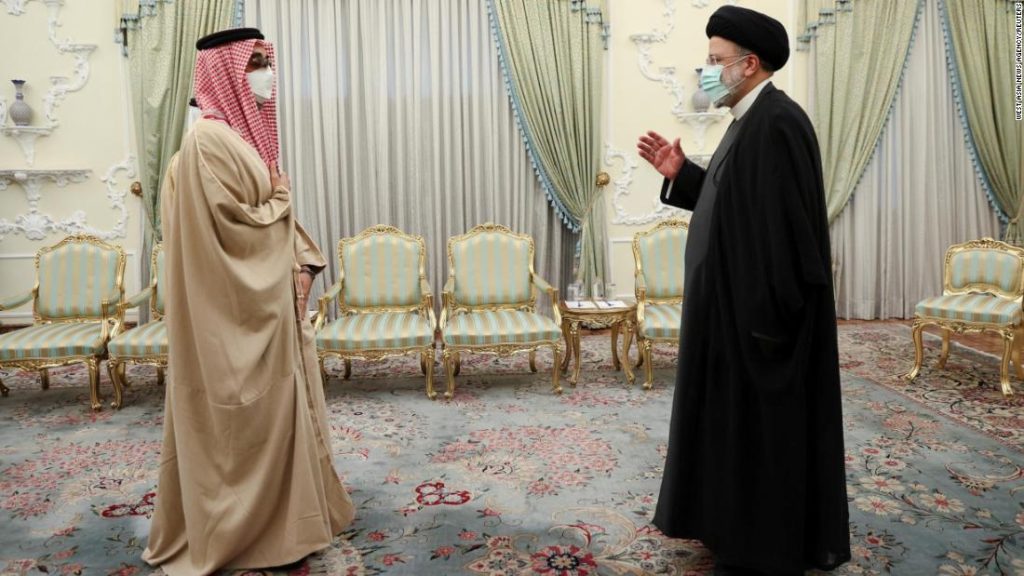Iran’s Arab foes are mending ties with Tehran amid uncertainty over nuclear talks

Iran’s nuclear agreement with world powers came into effect that month, but the The rapprochement comes amid uncertainty about the progress of indirect talks between the US and Iran to restore the nuclear agreement. If there is a new agreement, it may reduce the likelihood of a nuclear arms race in the already-tense region. But Gulf states fear that lifting the sanctions on Iran will unlock billions of dollars that can be used by Tehran to further arm itself and expand its influence in Arab countries through proxies. If the talks fail, observers say regional tensions could escalate as they did when then-US President Donald Trump withdrew from the agreement, potentially dragging the region to war. For Gulf states, both scenarios are a cause for concern. “For the Gulf Arabs, a return to the nuclear deal or no return is more or less the same: They anticipate that Iran will lash out in the region no matter the outcome,” said Esfandiary. “So, while they continue to watch this carefully, the efforts to improve their ties are more closely linked to their security and threat perceptions than the nuclear deal itself.” Abdulla said Iran remains a serious threat to Gulf security “with or without” a nuclear agreement. “So, one way to deal with Iran is to continue the conversation and find common ground for good neighborly relations.” Saudi Arabia and Bahrain are the only Gulf Arab countries with no ambassador in Tehran. Iran said on Monday that talks with Saudi Arabia were a separate matter from talks to revive the nuclear pact, adding that cooperation between Tehran and Riyadh could help restore calm and security in the Middle East. The resumption of diplomatic ties is “not a silver bullet,” Baharoon said. “It is an important step, nonetheless. Diplomatic ties are lines of communication that help directly in reducing tension and dealing with it. [We] can’t have cooperation if we are not talking to each other.” The digest US says Iran drops key demand as progress on a revived nuclear deal edges forward A senior US administration official told CNN on Friday that Iran had dropped a key “red line” demand that had been a major sticking point in efforts to revive the 2015 nuclear deal. The Iranians also dropped demands related to delisting several companies tied to the country’s Islamic Revolutionary Guard Corps (IRGC), the official said. Iran on Monday said the US had “not yet responded to the proposals of the European side” and accused the US of “procrastinating” in talks. Background: US President Joe Biden has insisted for months that he would not lift the IRGC terrorist designation in order to revive the nuclear deal. The policy is one of several foreign policy decisions made by Trump that Biden has maintained. Trump designated the IRGC as a terrorist organization in 2019 as part of a “maximum pressure campaign” imposed after he withdrew the US from the deal in 2018. Why it matters: In its response last week to a draft nuclear deal agreement proposed by the European Union — which the EU has described as a “final” draft — Iran did not demand that the IRGC be removed from the US list of terrorist organizations, the official said. “The current version of the text, and what they are demanding, drops it,” the official said. “So if we are closer to a deal, that’s why.” Landslide hits Shiite shrine in Iraq killing at least 7 people At least seven people were killed after a landslide struck a Shiite mosque west of Karbala province in Iraq on Saturday, according to the Interior Ministry. The total number of people trapped under the rubble is still unknown. Background: The incident happened on Saturday when a large hill adjacent to the Qattara shrine of Imam Ali slipped due to moisture saturation, according to statement from Iraq’s Civil Defense. The landslide fell on the roof of the shrine which then collapsed onto visitors. The Civil Defense said on Sunday that so far five bodies have been recovered from under the shrine’s rubble. Iraqi Prime Minister Mustafa al-Kadhimi directed the minister of interior Sunday to have direct field supervision of the rescue efforts and to mobilize the civil defense and medical services to ensure the safety of the injured and rescue of the civilians trapped under the ruins. Why it matters: Iraq has been mired by its worst and longest political crisis in years. At the center of this conflict stands Iraqi political kingmaker Moqtada al-Sadr and a rival bloc of parties with strong ties to neighboring Iran. In his first comments on the landslide, al-Sadr said that corruption of the authorities is now affecting places of worship. “Once again, suspected corruption caused casualties among civilians. But this time corruption involved places of worship … We call on the government for an immediate and serious investigation to reveal the truth so corruption doesn’t affect mosques and places of worship as it has done with the country’s institutions and ministries,” he said. Plane failed to descend as pilots reportedly fell asleep during flight Two pilots are believed to have fallen asleep and missed their landing during a flight from Sudan to Ethiopia last Monday, according to a report by commercial aviation news site Aviation Herald. The incident took place on board an Ethiopian Airlines Boeing 737-800 en route from Khartoum to Addis Ababa, the report said, “when the pilots fell asleep” and “the aircraft continued past the top of descent.” Background: Aviation analyst Alex Macheras has since taken to Twitter to express his shock at the “deeply concerning incident,” which he suggests may have been the result of pilot exhaustion. “Pilot fatigue is nothing new, and continues to pose one of the most significant threats to air safety — internationally,” he tweeted on Thursday. Why it matters: The report comes just months after pilots at Southwest Airlines and Delta Air Lines warned airline executives in a letter that pilot exhaustion was on the rise and urged them to treat fatigue and the resulting mistakes as a safety risk. According to the letter, the rising demand for air travel as the industry begins to bounce back from the Covid-19 pandemic, and cancellation chaos brought about by severe weather, were among the reasons for the increase in pilot exhaustion. Around the region Iraq’s foreign ministry has recalled its ambassador to Jordan after photos of him and his wife with a famous Lebanese singer caused a storm on social media. The photos show the ambassador, Haidar Al Athari, and his wife posing with music star Ragheb Alama. The three are pictured standing very close to each other, with Al Athari’s wife in the middle. Some users accused the ambassador and his wife of flouting diplomatic protocol by embracing the singer, while others decried the controversy as a storm in a teacup for a country that faces a host of problems. Much of the criticism was directed at the ambassador’s wife, who in one picture is seen holding the singer’s hand. “We are following closely what’s been shared on social media, of pictures involving the ambassador of Iraq to the Jordanian Hashemite Kingdom… suitable procedures will be taken as soon as possible on this matter, in a way that boosts Iraqi diplomatic values,” said the ministry’s official spokesman Ahmed Al-Sahhaf. Layal Shaker, a resident of Iraq, pointed out how her country has bigger fish to fry. “Iraq has shifted its focus from Zakho’s shelling that killed nine people, the political deadlock engulfing the country, the shrine collapse, to photos of the Iraqi ambassador’s wife with Ragheb Alama.” By Mohammed Abdelbary $1.3 trillion Middle Eastern oil exporting states are expected to earn up to $1.3 trillion in additional oil revenues over the next four years, the Financial Times reported, citing the International Monetary Fund. The rise in oil prices caused by the war in Ukraine has seen Gulf states record budget surpluses after years of posting deficits. Photo of the day




